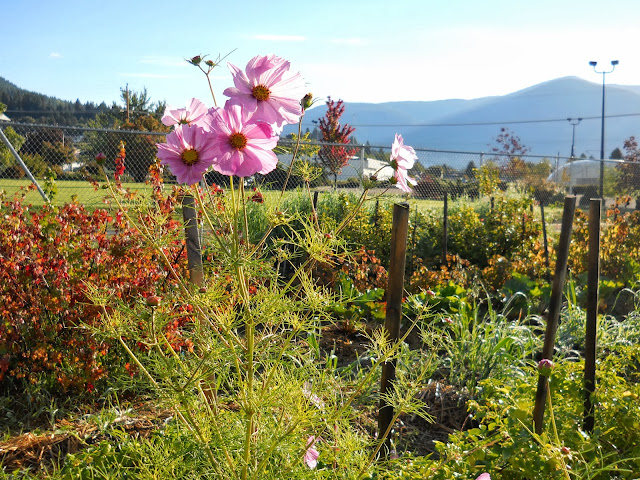The Wonderful World of Compost

Making compost it about keeping your soil life diverse and thriving. Soil amendments and fertilizers for your plants can be useful, but these don't necessarily take into account of your soil community. People spend years and years studying the tiny little critters that live in your soil so I'm not going to pretend to be an expert on this- but try to think of your soil as a diverse community instead of dirt for a start. The soil is hopefully full of bacteria, fungi, nematodes and all kinds of critters that help your plants grow strong and healthy. By adding compost to your soil, you are adding complexity and intelligence that will help all those critters out. In turn, you will get beautiful tomatoes (for example).
So to recap- if you make good compost, your soil will be happy, your plants will be happy and then you will be happily eating the yummy plants.
Ok- so how to do this? There are five things that are absolutely necessary in compost making:
- Pile size
- This is one of the biggest problems for urban environments.
- Your minimum size should be 1 cubic meter!! But it will shrink down as it composts. You will probably lose about ½ the volume (if not more) when it is finally done.
- This cubic meter provides enough space for heating and sets a stable environment for microorganisms.
- Carbon to nitrogen ratio (30 to 1)
- Mixture of greens(nitrogen rich) and browns(carbon rich). You could equate greens to proteins and browns to carbohydrates in human diet.
- Greens are things like kitchen waste, fresh weeds and plants, animal manure
- Browns are things like fallen leaves, straw, chopped woody debris, newspaper, sawdust, unwaxed cardboard.
- Moisture
- Want it to be like a wrung out sponge.
- Air
- Want a mixture of dense and lighter materials. Coarse materials can be helpful by letting air in the pile but if they are too big then they won't break down. If you want things to break down really fast you need to chop things up well.
- Heat
- Want it to get hot enough. Several different types of micro-organisms will find their way to your compost if you build it.
- Psychrophiles- below 0C- 15C, They are cooler temperature aerobic bacteria that burn or oxidize carbon and generate some heat. They generate enough heat so the next group of bacteria can get started on breaking down the compost pile.
- Mesophiles- 15C-45C. Mesophiles do most of the decomposition work. They generate even more heat and break things down so that the thermophiles can start their work.
- Thermophiles. 40-70C. These are heat lovers. We want these if we want a hot compost. These bacteria only live for three to five days in you compost pile. Sometimes if you turn the compost pile after the heat has spiked for 3-5 days, you can get a second run of thermophilic bacteria.
How do I build a compost?
The best way to make a hot compost in urban environments is to have a three bin system where you have the one bin to collect your materials (i.e. you put your food scraps, your leaves, grass clipping etc into that bin for storage), you have another bin for active compost, and one bin which is your finished compost. When you have used all your finished compost and have enough materials to make a new compost pile, take the stored materials and start making a new active compost.You do this by layering greens and browns one top of each other until you have 1 cubic meter or more. Some people but layers of broken up brambles or coarse material interspersed between some of the layers for extra aeration. Break up any clumps and try to fluff things up as you are building it. Water it and leave it. If you have a long probed thermometer you can monitor how hot it gets to see what stage it is at. When the temperature starts to go down, turn the materials from the outside to the inside and vice versa. Wait for 3-6months depending on climate and time of the year. Voila!
I could talk about compost more but instead I'm going to direct you to the Greater Victoria Compost Education Centre for more information. Also check out the construction plans a rodent proof compost bin here.
Happy composting!


This comment has been removed by the author.
ReplyDeleteNice one! From experience, the rodent proof compost plans are great. I enjoyed reading about the psychrophiles, mesophiles, and thermophiles - fancy!
ReplyDeleteOh BTW - have you seen this old school compost video? http://www.youtube.com/watch?v=MnhkU8H0EkI
They talk about the year 2000 like the future : )